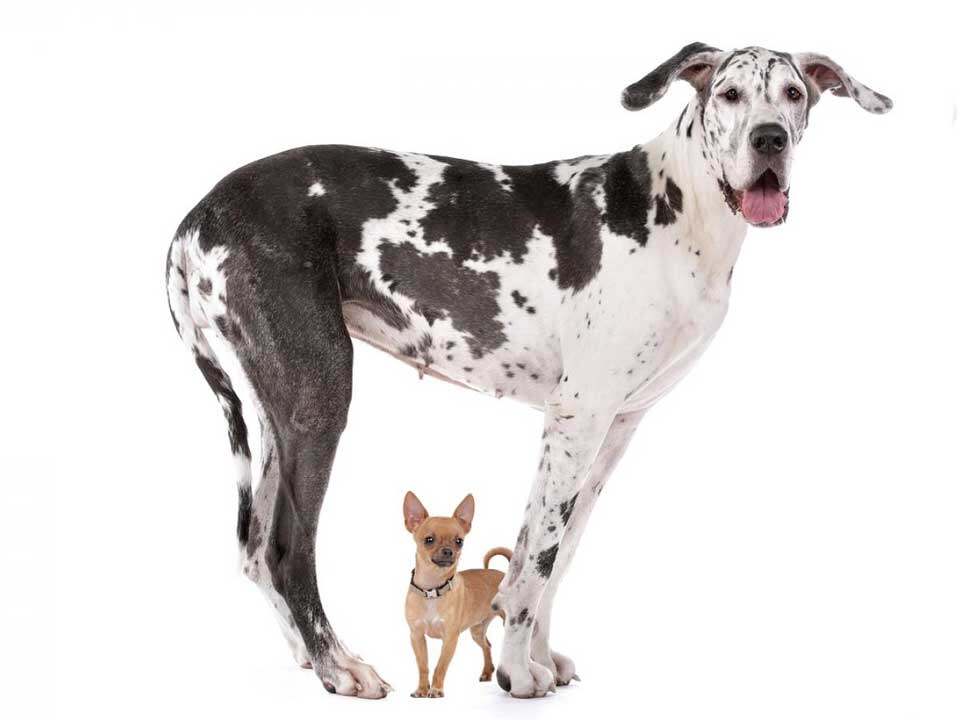Scientists have for the first time explained why larger dogs have shorter lifespans than smaller dogs – selective breeding for size has made large breeds more susceptible to cancer.


University of Adelaide experts examined the causes of differences in lifespan and death in 164 dog breeds, ranging in size from chihuahuas to Great Danes.
“When we analysed these data sets, we discovered that larger dogs were more likely to die from cancer at a younger age when compared with smaller dogs,” said Dr Jack da Silva from the University of Adelaide’s School of Biological Sciences.
“Larger dogs didn’t necessarily age faster than the smaller breeds, but the research did show that as the breed’s average body weight increased, so did the rates of cancer.”
“We believe the relationship between a dog’s body size and their lifespan may be caused by an evolutionary lag in the body’s cancer defences, which are unable to keep up with the rapid and recent selective breeding of bigger dogs,” he said.
The study, which has been published in the journal The American Naturalist , found the shorter lifespans were consistent with a theory of ageing known as life history optimisation or the “disposable soma”.
“This theory is based on the idea that if you invest most of your resources and energy into growth and reproduction, you can’t also invest them in cell repair and cancer defences. In all organisms, the focus is on reproducing early, even if it comes at the expense of maintaining and repairing the body and living longer,” said Dr da Silva.
The results could also be useful when looking at ageing in humans.
“WE BELIEVE THE RELATIONSHIP BETWEEN A DOG’S BODY SIZE AND THEIR LIFESPAN MAY BE CAUSED BY AN EVOLUTIONARY LAG IN THE BODY’S CANCER DEFENCES, WHICH ARE UNABLE TO KEEP UP WITH THE RAPID AND RECENT SELECTIVE BREEDING OF BIGGER DOGS.”
-Dr Jack da Silva, Researcher, School of Biological Sciences, University of Adelaide.
“Dogs represent a good model for studying ageing in humans. Dogs, like humans in the industrialised world, live in an environment that tends to protect them from accidental and infectious causes of death and are thus more likely to die from age-related diseases, such as cancer,” said Dr da Silva.
Although the results of this survey may be concerning for owners of large dogs, the researchers predict bigger breeds will evolve to develop better cancer fighting genes.
“Most of the 400 or so dog breeds we know today have only been established in the past 200 years. Larger dogs haven’t had time to evolve better cancer defence mechanisms to match their size. This could still happen, but it may come at a cost to reproduction,” said Dr da Silva.
Dr da Silva predicts larger breeds will adapt and extend their lifespan but based on the theory of ageing, they’re more likely to have smaller litter sizes in the future.
“This may occur naturally or through selective breeding, as people focus on breeding larger dogs that have lower cancer rates and thus greater longevity,” he said.
This research was the result of a year-long comparative analysis study using published data about dog breeds from across the globe.
Dr. da Silva is currently looking into the connection between litter size, cancer rates and lifespan in dogs and other mammals.






































